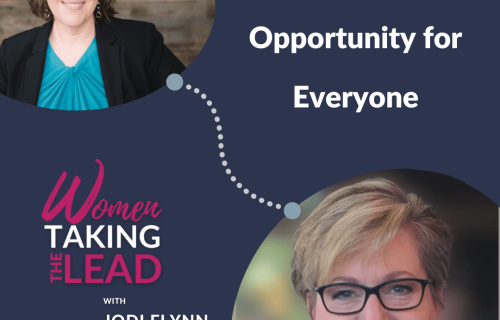
How to Graciously Admit You Don’t Know and Keep Your Credibility
Click the play button to listen to the podcast episode.
As a woman leader you are constantly being sent the message to be more assertive and confident.
Confidence and assertiveness do have their place. Most times I would encourage women leaders to embrace confidence and feel free to be assertive. However, never is this at the expense of honestly admitting when you don’t know.
If you don’t know the answer to a direct question, ‘I don’t know’ is the beginning of a good conversation. But, balancing your confidence and owning up to a lack of knowledge or competence in a certain area can be tricky.
This episode covers how to graciously admit you don’t know in a way that engenders more confidence in you as a leader.
Admit you don’t know? I Didn’t Know!
In my 20s my first few promotions in Mutual Fund Operations were within the area I had the most competence. That was Shareholder Processing. These were transactions that were for the most part initiated by the shareholder.
I was trained in this area and gained a lot of experience by doing. When I was promoted within the group it was relatively easy for me to guide my team. I had the answers to almost everything. When I didn’t know the answer, it was forgiven. That’s because it tended to be a really odd item. And, I could get the answer through my usual resources.
Then I was promoted to oversee a department I didn’t have experience in.
I was the manager but I had never walked in the shoes of the team working in that department. However, this department worked collaboratively with Shareholder Processing so my background knowledge was helpful in this situation. What also worked in my favor was my utmost trust and respect for the person who was the supervisor of that department.
Then I was promoted to lead Corporate Quality. Suddenly I was being asked to weigh in on topics I had no background in. Added to this, I was the youngest person to be promoted to that level in the company history.
It Can Burn to Admit You Don’t Know
Saying “I don’t know” started to make me feel uneasy and the so-called Imposter Syndrome would kick in.
This was a reckoning for me. Luckily, I learned quickly that pretending I had knowledge or a competence that I didn’t have wasn’t a good idea. It made me look foolish and irresponsible.
I had to quickly get accustomed to admitting that I didn’t know or I wasn’t sure. However, in that process, I learned how to inspire others to have confidence in me even though I wasn’t the most knowledgeable person in the room.
There are consequences to not considering or owning that you don’t know. You lose the opportunity for exploration, discovery, learning, and making progress. It’s more difficult to become more competent if you’re not willing to examine your own incompetence.
Also, if you’re assertion of knowledge and competence is called out you will lose credibility, trust, respect, and influence as a leader. Once you’ve lost those quantities, it can be arduous to earn them back. That’s a pretty steep price to pay.
Now we’re ready to look at how to graciously admit when you don’t know and handle the situation in a way that engenders more confidence in you as a leader.
Graciously Admit You Don’t Know
The key to graciously admitting you don’t know and keeping your credibility is curiosity.
If someone is looking for an answer from you that you don’t have, get wildly curious about their question. From that space admit you don’t know, you aren’t sure, or that it is not in your area of competence.
Saying you don’t know from a place of genuine curiosity does a few things all at the same time.
First, rather than shutting the questioner down it opens up the conversation. You are signaling you are willing to engage.
Second, it nonverbally acknowledges that the question is a valid question and you’re willing to help. Even if all you do is send them on to the right person to ask, you have been a help.
Are they really expecting you to know?
As leaders we can often overestimate how much others are expecting us to know all the answers. When in fact, they may be coming to you as a starting place.
Now, whether or not the question should have come to you or to someone else in the first place is something else entirely. Later you can reinforce who is the right resource for what if that’s relevant. For now, the question landed at your feet, it’s a valid question, and you’re willing to help.
Third, you are also signaling that you are willing to learn the answer. You may not want all the minute details of the answer. Especially if it’s not your area of expertise. But, perhaps knowing more about the subject will benefit you in the future.
Remember what I said earlier? Saying “I don’t know” is an opportunity for exploration, discovery, learning, and making progress.
When You Don’t Know and You Need to Know
Now let’s explore when you don’t know and yet your role requires that you do know.
The time to start working on expanding your resources is now.
How do you do this?
Network!
There will be a time in the future you will need to find answers quick and the best way to do that is to ask people with more experience and those with subject matter expertise.
Always be networking to build good relationships with these people. They can help you close tricky knowledge gaps better than Google.
One or two of these people may also make a great mentor. Whether it’s a formal mentorship relationship or an informal one, having “elders” you can go to is priceless.
When you are faced with a situation in which you really need to get the answer, go to the experts.
Again, honestly admit you don’t know and one option is to add, “but I’ll find out.”
Then think about who in your network has more knowledge on this topic or can connect you with someone who does.
By asking for help and advice, you’re bound to get better, more complete information than you could find on your own.
Invite the Other Person In
Another option, after admitting you don’t know, is to invite the person who is asking to work collaboratively on finding the answer or information that’s needed.
This may be a good opportunity for you and your team member to find the answer together.
You’re Supposed to Admit You Don’t Know
Something else I’d like to add is that we often assume that we were given our role with the expectation that we already have all the knowledge, experience, and answers that the job requires.
Let me challenge this assumption.
I would guess that before being given your current position you were vetted to make sure you had a working knowledge of your area of responsibility.
I’m going to go out on a limb here to posit that rather than being expected to have all the answers, the expectation is that you will be resourceful when faced with not having the knowledge or competence that a situation requires.
That, in your resourcefulness, you will be regularly closing the gap between your current knowledge and competence and what each new situation requires of you.
Your ability to be resourceful and to develop problem solving and resourcefulness in your team goes far beyond the value of you being an expert on a certain subject.
Senior Leadership Goes Beyond What You Know
And, as in my situation, the further up you are as a leader the less you will be expected to be the expert. Instead, you will be the person who needs to know how to manage experts, how to ask great questions, and bring the best out of your people.
Often leaders get stuck after their first or second promotion because they don’t know how to let go of the relative safety of being the expert and stepping into the unknown of developing experts and developing other leaders.
Can you let go of being the expert and admit you don’t know?
If you need help with this, let’s chat!
If your last promotion left you feeling unstable in your leadership role, or you are looking to develop into your next role, I invite you to consider working with me. You will be support you through the transition, and confident in your leadership once again. Schedule a meeting to chat with me.
Going to ask your company to sponsor you to work with a coach? This checklist will help you to prepare for that conversation. https://womentakingthelead.com/checklist
As always, I hope this was of value to you, and here’s to your success!
Resources
Apply to be on an “On-Air Coaching” episode: Are you a female leader who has been promoted in the last year? You are invited to apply to be on the podcast.
Leadership Operating System Inventory. Wondering what kind of Leadership traits you have? Take this FREE, FAST self-assessment and find out more about yourself as a Leader.
Accomplished: How to Go from Dreaming to Doing. The book containing a simple, step-by-step system that gives you the structure to take your goals and make them happen.
The Women Taking the Lead Podcast
Subscribe through Apple Podcasts, Spotify, Google Podcasts, iHeart Radio, Stitcher Radio, Amazon Music or Pandora and never miss out!


